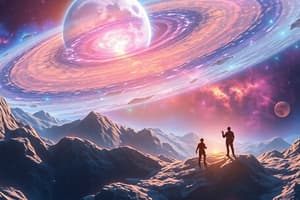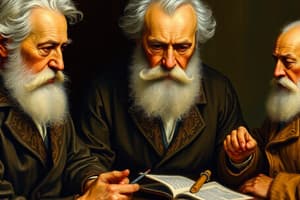Podcast
Questions and Answers
Which theory did Fred Hoyle famously support, despite its eventual discreditation in the 1960s?
Which theory did Fred Hoyle famously support, despite its eventual discreditation in the 1960s?
What significant scientific role did Katherine Johnson play during the Apollo 11 mission?
What significant scientific role did Katherine Johnson play during the Apollo 11 mission?
What was one of Vera Rubin's major contributions to astronomy?
What was one of Vera Rubin's major contributions to astronomy?
What groundbreaking theory is Abdus Salam most known for?
What groundbreaking theory is Abdus Salam most known for?
Signup and view all the answers
What unique medical area did Irene Uchida focus her research on?
What unique medical area did Irene Uchida focus her research on?
Signup and view all the answers
For what discovery was Mario J. Molina awarded the Nobel Prize in Chemistry?
For what discovery was Mario J. Molina awarded the Nobel Prize in Chemistry?
Signup and view all the answers
What innovation is Donna Strickland known for in the field of laser physics?
What innovation is Donna Strickland known for in the field of laser physics?
Signup and view all the answers
What did Eric Kandel's Nobel Prize-winning research focus on?
What did Eric Kandel's Nobel Prize-winning research focus on?
Signup and view all the answers
What genetic discovery is Lap-Chee Tsui best known for?
What genetic discovery is Lap-Chee Tsui best known for?
Signup and view all the answers
Which of the following accurately describes the research focus of Carol Greider?
Which of the following accurately describes the research focus of Carol Greider?
Signup and view all the answers
Flashcards
Steady State Theory
Steady State Theory
The theory that the universe's average density remains constant as it expands due to continuous creation of matter.
Abdus Salam
Abdus Salam
Physicist who proposed electroweak theory, unifying weak interaction and electromagnetic force.
Higgs Boson
Higgs Boson
A particle predicted to exist from the Higgs field theory, which explains mass of elementary particles.
Vera Rubin
Vera Rubin
Signup and view all the flashcards
Chirped Pulse Amplification
Chirped Pulse Amplification
Signup and view all the flashcards
Irene Uchida
Irene Uchida
Signup and view all the flashcards
Katherine Johnson
Katherine Johnson
Signup and view all the flashcards
Telomeres
Telomeres
Signup and view all the flashcards
Donna Strickland
Donna Strickland
Signup and view all the flashcards
Mario Molina
Mario Molina
Signup and view all the flashcards
Study Notes
Directory of Scientists
- Science is becoming more diverse and interconnected. Researchers globally collaborate to expand knowledge and develop more comprehensive theories.
Fred Hoyle (1915-2001)
- British astrophysicist, studied star element origins, and proposed the steady-state theory of the universe's expansion, which was later largely discredited.
Irene Uchida (1917-2013)
- Canadian medical geneticist, studied how genes and chromosomes influence health, including researching genetic conditions and chromosome abnormalities.
Katherine Johnson (1918-)
- Award-winning mathematician, crucial in calculating trajectories for numerous space missions, including Alan Shepard's. Worked at NACA then NASA, impacting Apollo 11 mission.
Yvonne Brill (1924-2013)
- Invented a propulsion system for unmanned spacecraft keeping them in stationary orbit, contributed to US rocket designs, and worked for NASA on rocket engines.
Abdus Salam (1926-1996)
- Pakistani physicist, proposed the electroweak theory, explaining the unified weak and electromagnetic forces in subatomic particles, and co-recipient of a Nobel Prize in Physics.
Vera Rubin (1928-2016)
- Discovered dark matter's presence in galaxies, challenging Newton's laws of gravity within galaxies' outer regions.
Peter Higgs (1929-)
- Developed the Higgs field theory explaining the origin of mass for subatomic particles, crucial to the Large Hadron Collider, and co-winner of a Nobel Prize in Physics.
Eric Kandel (1929-)
- Studied the biological mechanisms behind memory in sea slugs, connecting simple nervous systems to how humans' memory works, a shared principle.
Mario Molina (1943-)
- Shared a 1995 Nobel Prize in Chemistry with Rowland for their work demonstrating chlorofluorocarbons (CFCs)' contribution to ozone depletion.
Lap-Chee Tsui (1950-)
- Canadian medical geneticist, jointly discovered the cystic fibrosis gene, a significant medical break through on a life-threatening disease.
Donna Strickland (1959-)
- Canadian optical physicist, developed chirped pulse amplification (CPA), a key laser technology advancement using lasers for numerous applications.
Carol Greider (1961-)
- Discovered the enzyme telomerase, which has a crucial role in protecting chromosome ends, impacting cell life and cancer research.
Mae Carol Jemison (1956-)
- First African-American woman in space, served as a mission specialist on the space shuttle Endeavour.
Studying That Suits You
Use AI to generate personalized quizzes and flashcards to suit your learning preferences.
Description
Explore the significant contributions of various scientists, including astrophysicists and medical geneticists. This quiz covers the innovative work of individuals like Fred Hoyle, Katherine Johnson, and Yvonne Brill, among others. Test your knowledge on their discoveries and impacts on science and technology.




